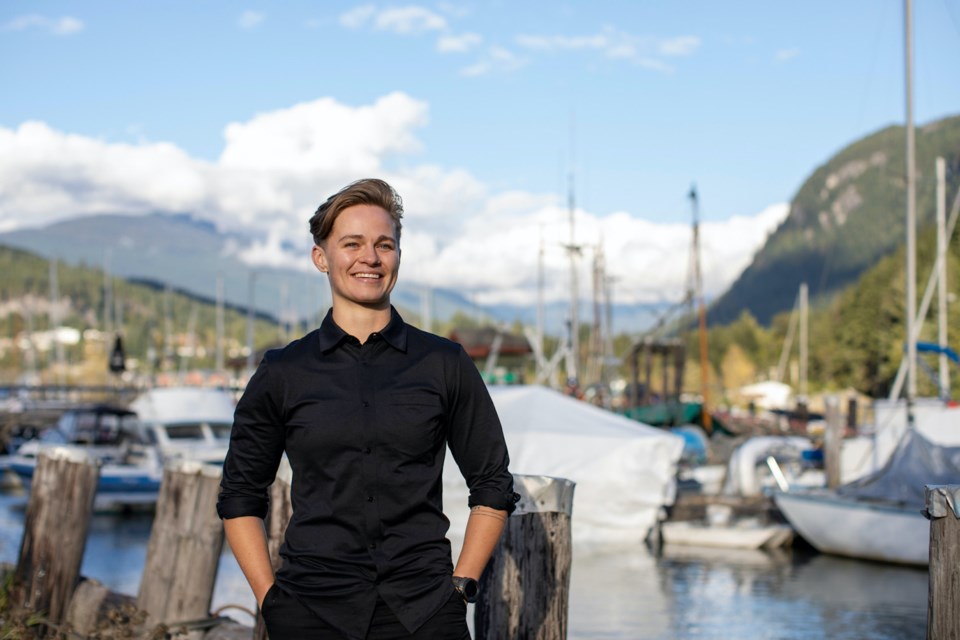CapU student Alysha Monk plans on spending a lot more time in Squamish in the coming months.
The 25-year-old is the lead researcher studying sustainable forestry practices in the Squamish area with the Howe Sound Biosphere Region Initiative Society (HSBRIS).
The Chief caught up with Monk while she was on the ferry to visit her parents at her family home in Gibsons to find out more about the project and how the kinesiology student ended up focused on our forests.
What follows is an edited version of that conversation.
Q: Obviously, forestry has long been a vital industry in Squamish, so can you tell me more about your research project?
A: Our goal with the project is to network and facilitate a conversation with timber harvesting businesses and people in forestry.
What we are doing right now is developing a database of timber harvesting businesses in the area including those involved in harvesting, trucking, sorting, booming and so on.
We are trying to cover all areas. We are creating this database so we have the names and contacts of people out there. There are three forest districts that oversee timber management in the area, but no such database exists right now.
And we want to meet with and interview folks involved in the industry.
What we want to understand is their sustainability practices currently.
Some of the companies have some pretty cool projects underway in regards to sustainability and the environment.
And we want to understand what barriers there are in regards to sustainability because we know they do have to jump through a few hoops to be able to do their jobs.
We also want to give them a voice.
We know it is quite a sensitive topic.
We want to hear their perspective, especially regarding the newly introduced provincial legislation.
It is supposed to be a conversation and also an opportunity to introduce the United Nation Sustainable Development Goals (SDGs), adopted by the United Nations that are to be met by 2030 to help with climate change, among other things.
We are hoping to promote those goals, educate and foster collaboration within the region to make it more sustainable.
The main goal is to bring together all these different stakeholders in the forest industry to learn and share.
Q: As you allude to, there is a lot of tension around the forest industry right now. So how do you bridge the gap? How do you have those conversations without the forestry folks being on their back feet about it?
A: I think it is really reiterating the fact that with this project, we really do want to hear their voices. They really are an important part of the community and the economy. The aim is not to discourage logging or discourage that piece of the economy but to hear their point of view and hear what they are doing. When I am talking to these people, I let them know we want to give them the space to talk about the good things they are doing.
So far, the response has been pretty good.
Q: What is the timeline for this project?
A: We had a six-month timeline starting in September. The university ethics application process was pretty lengthy and I like the interviews to be in person so that has taken a bit longer. Therefore, it is going to be give-or-take six months.
Q: All of this is related to the designation of the Átl'ka7tsem / Howe Sound Biosphere Region becoming Canada’s 19th UNESCO-designated Biosphere Reserve, correct?
A: Yes, our partner organization for the project is the Howe Sound Biosphere Region Initiative. We also got some funding from a non-profit research organization called Mitacs.
Q: What is your perspective on what the designation will mean for our region?
A: A big part of it is the education piece and fostering collaboration and that means all the different industries. A big focus for them has been marine life and now this new project is focusing on forestry. We want to bring it all together. The sustainable development goals are really important, especially if we want to mitigate the effects of climate change. Watching COP26, the projections for the planet are not great.
It is really important we start doing something about it and I think education and collaboration is the first step.
Q: You are a kinesiology student, but you wanted to branch off and do something to help people and the planet and so took on this project. When do you graduate and what do you hope to do afterward?
A: I graduate in the spring of 2023 if everything goes to plan. I don't know exactly what I want to do yet, but I do know I want to do something that will better the community and the environment.
.




